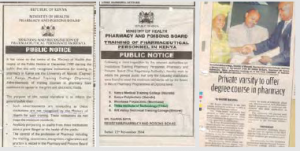Mount Kenya University’s pharmacy training journey is the stuff that powerful folktales are crafted from. The hurdles that the university had to overcome in its formative years are legendary and legion. Dr John Kisengi, Accreditation Co-ordinator, College of Health Sciences, had been at the history- making university before it evolved from Thika Institute of Technology. He witnessed these interesting developments. He reveals that for the university to be granted authority to mount the Bachelor of Pharmacy degree was nothing short of the extraordinary if not a miracle.

Consider this: Thika Institute of Technology, the university’s forerunner, hit the higher education scene when pharmacy training was the preserve of two public institutions. Only the University of Nairobi offered the Bachelor of Pharmacy, while only Kenya Medical Training College (KMTC) offered diploma in the same field of study. Also consider that to mount a health science programme requires massive investments in equipment and faculty. The institution must also develop a suitable curriculum for accreditation by both the Commission for University Education and the Pharmacy and Poisons Board.
Then keep in mind the fact that MKU, like its precursor, is a privately funded institution. It is not funded by Government, a faith organisation, a professional body or a non-governmental organisation.You then begin to appreciate the mountains the institution had to climb to become the first private university in Kenya to offer the Bachelor of Pharmacy degree. It made history when it did. Some well-established universities tried to offer the programme and failed. They have never re-ignited interest in it.
Dr Kisengi recalls that even for TIT to be allowed to offer a diploma in pharmacy was an uphill task. The door to pharmacy began to crack open for private institutions in Kenya when in 2002, the government succumbed to the need to train more paramedical personnel. TIT began to train pharmacy dispensers at certificate level. Then the then Kenya Institute of Education (KIE), now
Kenya Institute of Curriculum Development (KICD), released an approved curriculum allowing institutions to offer the certificate course. However, industry regulator Pharmacy and Poisons Board (PBB) ran a newspaper advert warning that only UoN was authorised to offer the Bachelor of Pharmacy degree programme.
The notice also said only KMTC could offer the diploma programme. Institutions of higher learning were displeased with the order because it locked them out. They petitioned Ms Charity Ngilu, the then Minister for Health, to rescind the decision. She obliged.
PPB retracted the advert and a task force to look into the matter of pharmacy training in Kenya was formed. The task force went around the country to establish which institutions had the infrastructure to train pharmacy technologists. It found that five institutions had the requisite infrastructure to offer the course. TIT was in the list published on 22 November, 2003, becoming the first private institution in Kenya permitted to offer the Diploma in Pharmacy programme. In 2004, TIT admitted the first class of pharmacy diploma students. A whopping 96 registered for the course.
The institute then embarked in investing in improving the academic resources (teaching staff and facilities) that led to success of the programmes. Thika Institute of Technology showed its intent to be a leading light in pharmacy training by having Bachelors and even Masters holders in pharmacy teaching in the Diploma programme, while other institutions were hiring Higher Diploma holders to teach in the diploma programme.
“In September 2005, The management realised that there were no affordable core pharmacy reference books and sponsored one of its senior Pharmacy lecturers’ at the time, Dr. Philip Mwagiru, to publish the first pharmacy textbook ever written by a Kenyan, for local and regional pharmacy training. The book, titled Fundamentals of Pharmaceutical Chemistry, remains the only locally authored pharmaceutical chemistry reference book that is in use


